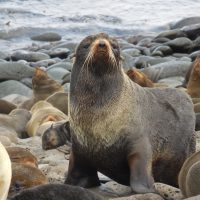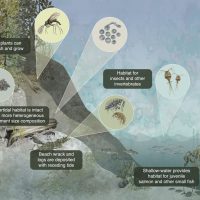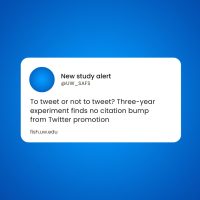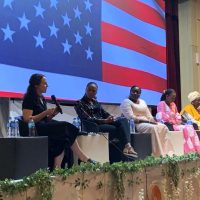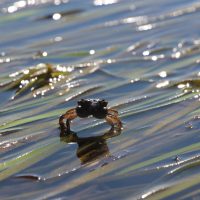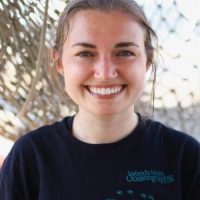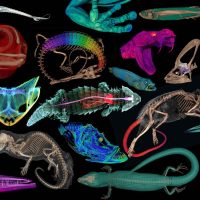Filter Results
Combining ecology with spatial data: New book delivers toolbox for ecologists
In a new book providing a guided walkthrough and toolbox to conduct population and ecosystem modeling at high-spatial resolution, James Thorson (SAFS alum and affiliate faculty, and Statistical Ecologist at NOAA) has co-authored Spatio-Temporal Models for Ecologists with Kasper Kristensen. Coming up with the idea for the book during a meeting at SAFS almost a decade ago, we sat down with James to find out more about why it’s a useful tool for ecologists.
Read moreLetting nature be nature: restoring Puget Sound’s shoreline
Stretching from Admiralty Inlet to the city of Olympia, Puget Sound has 1330 miles of shoreline, of which 25% is armored. In a new paper, SAFS Research Scientist Simone Des Roches, led a team studying the impact of armor removal and other restoration activities on shorelines through time in Puget Sound locations.
Read moreAn ambassador for diversity in marine science: a conversation with Xochitl Clare
Recently contributing to a special Oceanography issue titled ‘Building Diversity, Equity, and Inclusion in the Ocean Sciences’ was Dr. Xochitl Clare, a postdoctoral scholar at SAFS.
Read moreSpring into Spring Quarter with SAFS Cafe
Spring into Spring Quarter with SAFS Cafe, back every Wednesday at 3.30pm.
Whether you’re a student, researcher, faculty, or member of staff, all are invited for cookies, coffee, and conversation every week.
Join us in the 3rd floor kitchen in the Fishery Sciences Building.
To tweet or not to tweet: three-year experiment finds no citation bump from Twitter promotion
In a controlled experiment spanning three years and involving 11 scientists from a range of life science disciplines, a new study published in PLOS ONE demonstrates that sharing a paper on Twitter did not increase citations.
It has long been asserted that papers shared on social media platforms, such as X (formerly called Twitter), receive a higher number of citations. However, a team of leading science communicators, led by University of Washington School of Aquatic and Fishery Sciences Professor Trevor Branch, with a combined total of 223,000 followers at the end of the experiment, wanted to explore whether increased citations was actually caused by tweeting about them, or was a correlation due to other factors such as the quality of the paper and the importance of the information in the paper.
Being an ecological detective: modeling population dynamics for humpback whales
Since 2017, Kristin Privitera-Johnson has been working with André Punt on creating a population model for North Pacific humpback whales as part of the work of the Scientific Committee of the International Whaling Commission. This population is modeled using various datasets – new, old, hidden, lost. Working with other members on their team, they’re uncovering new ways to deliver deeper insights into this population of humpbacks, including use of genetic and photo IDs data on population connectivity.
Read moreScience diplomacy at work: tackling illegal, unreported and unregulated fishing
In her role as a US Science Envoy, SAFS Assistant Professor Jessica Gephart was selected as one of seven distinguished scientists in January 2023, with this position extended through 2024. Through this role, Jessica is part of a team which helps inform various US institutions and the scientific community about opportunities for science and technology cooperation abroad.
“Science diplomacy creates an opportunity for knowledge exchange across borders and allows the US to model scientific independence,” Jessica shared.
New paper: Shellfish aquaculture farms as foraging habitat for nearshore fishes and crabs
As interest and investment in shellfish aquaculture have expanded both locally and globally, so has interest in how these farms modify intertidal habitat and whether the complex structure created by the shellfish and shellfish growing gear provides ecosystem services that are comparable to those of unfarmed areas, such as mudflats and eelgrass meadows.
Read moreESA 2024 grad student policy award cohort named, includes Helena McMonagle
The Ecological Society of America (ESA) has announced the recipients of the 2024 Graduate Student Policy Award, for students engaged in advocacy with an interest in science policy, which includes SAFS grad Helena McMonagle.
Read moreScientists CT-scanned thousands of natural history specimens, which you can access for free
Natural history museums have entered a new stage of discovery and accessibility, where scientists around the globe and curious folks at home can access valuable museum specimens to study, learn or just be amazed, led by a team including UW scientists and the Burke Museum of Natural History & Culture.
Read more